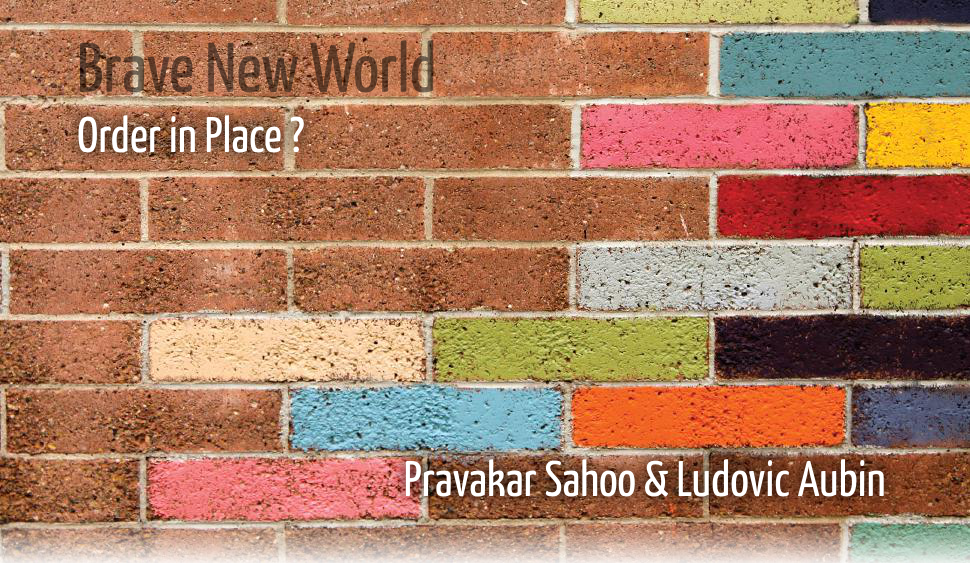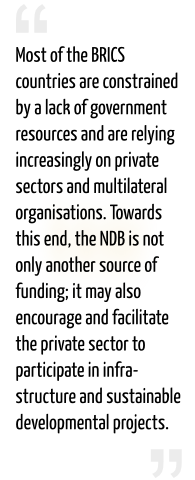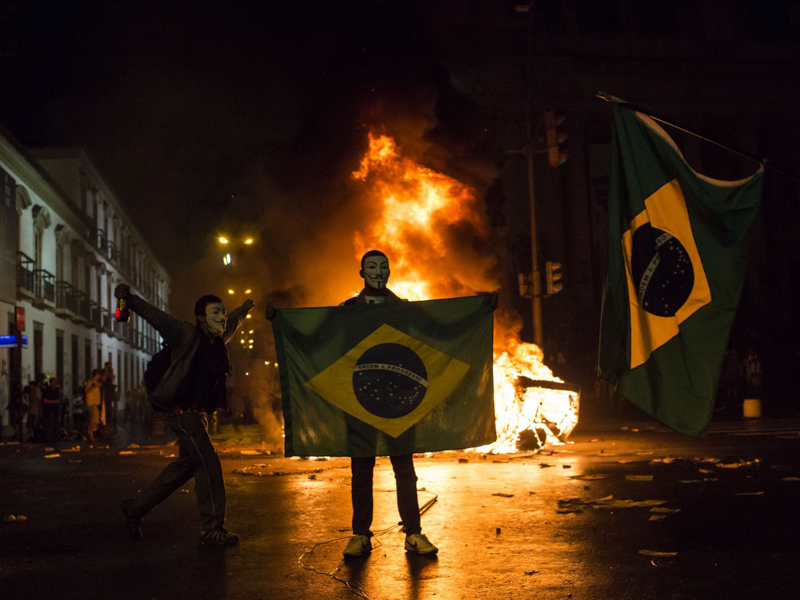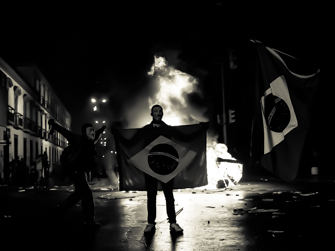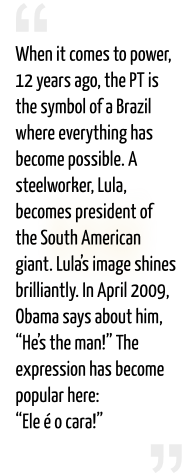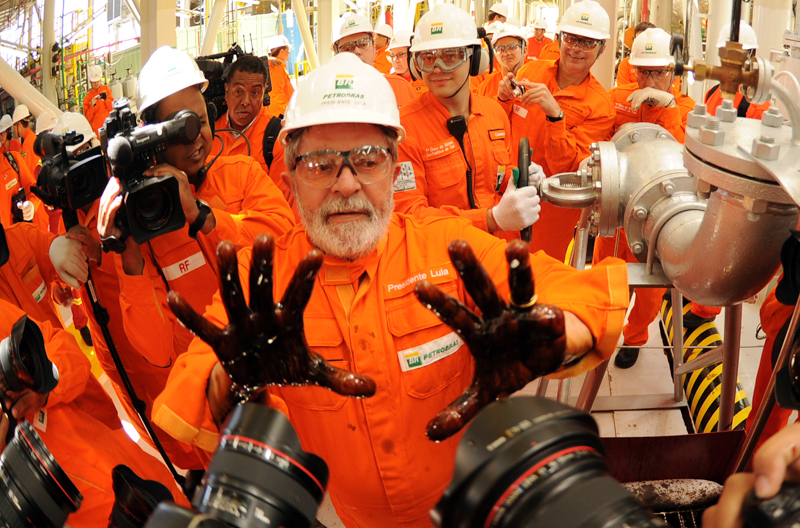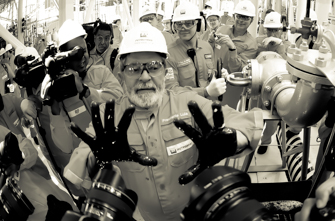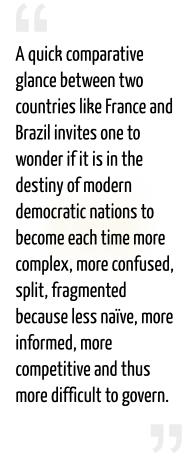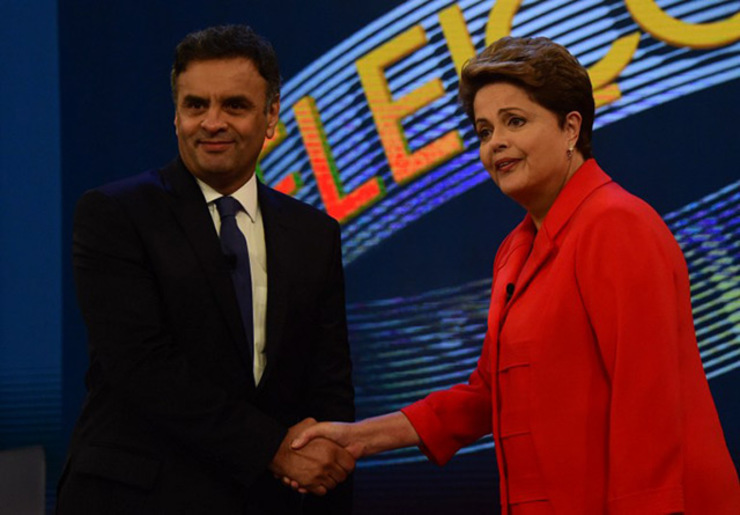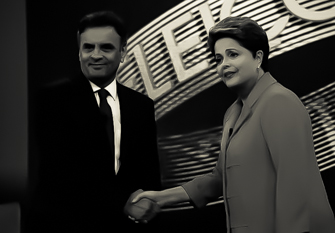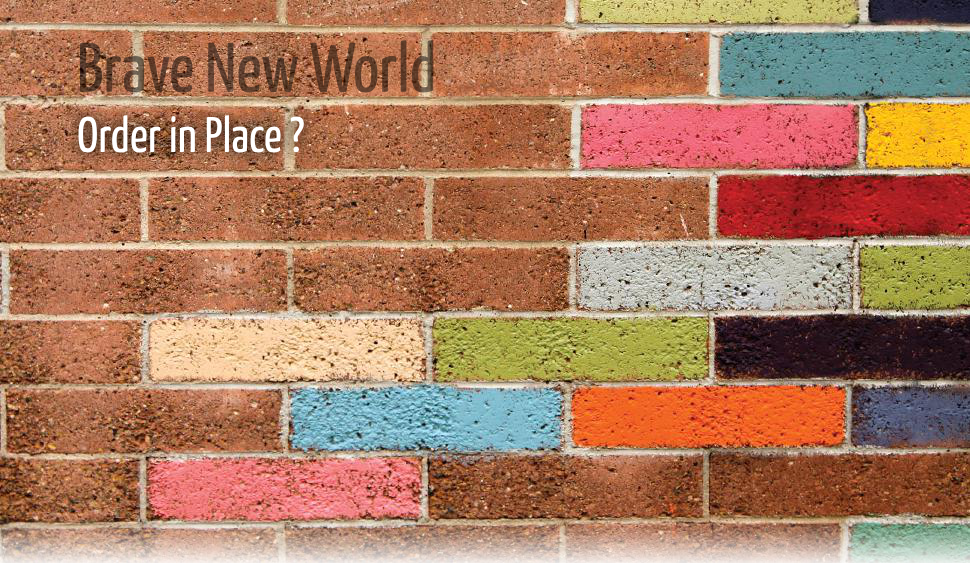
7 November 2014Between dreams and actual history, it takes more than good intention and even genuine resolve for nations to turn ideals into concrete realities. Our words reflect the ambiguities of such major changes. We may talk of emerging economies, but the term emergence implies processes arising from existing systems, yet novel and distinct from the properties of those systems. Are the drafts of our emerging economies so fundamentally different from the rules of the past and present world orders? Likewise, before becoming the politically correct term of Western economists, the very word development went back to the late 1500 Middle French desvelopper, which meant taking out of an envelope. But, indeed, while developing countries is clearly the hashtag of our age, we cannot expect the said countries to unveil themselves completely free of the marks and folds of the Western envelope. A few months back, the new world leaders of the BRICS announced proudly the dawn of a new financial day, with a New Development Bank, multipolar in its very structure. But while its inauguration is still months away, doubts already arise as to the power struggles of its members, starting with China and India. And, on the other side of the Pacific, Brazil is portrayed as the ultimate model of a deeply multicultural society, while the recent popular arisings there have reminded us of the reality of its economy dependent on huge income disparities. This week on LILA Inter-actions, Pravakar Sahoo goes back to last summer’s instantaneous exaltation behind the BRICS’ New Development Bank, and highlights the deep paradigm shifts that the member countries will have to tackle to build a truly multipolar world order. Ludovic Aubin reflects on the recent Brazilian elections and their direct roots in the political era of Lula’s Partido dos Trabalhadores, which culminated in the paradox of the modern, multicultural and emerging economic power as a necessarily fragmented society. Hold the cursor on the illustrations to display animations. |
|||||||||
Dreams of a Multipolar World OrderPravakar Sahoo |
Paradoxes of a Modern DemocracyLudovic Aubin |
||||||||
Requested file could not be found (error code 404). Verify the file URL specified in the shortcode. |
Listen |
Listen |
Requested file could not be found (error code 404). Verify the file URL specified in the shortcode. |
||||||
|
The structure of the world economy has undergone substantial changes over the last couple of decades, mainly due to the rise of a few emerging countries. Most prominent among them in terms of the present economic strength and also future potential are Brazil, Russia, India and China. These four countries started the yearly BRIC summits in 2009, and the group was renamed BRICS in 2011 with the entry of South Africa. Today, the BRICS’ GDP, with $16 trillion, accounts for almost 30% of the World’s GDP in PPP terms, and these five countries have a share of 20% in world trade. Some of the economic, geographic and demographic features of this group make it a formidable economic block, which can potentially restructure the balance of power in the world economy. The BRICS account for 30% of the world’s’ territory, 43% of world population and 40% of the international reserves. The BRICS countries understand the complementarity they possess for one other in terms of human power, natural resources, mass production base and knowledge resources. Therefore, the initiatives of this group for more economic integration among themselves, through a forum like the BRICS summits first, and now a bank, the New Development Bank (NDB), are significant ones. These will have implications for a new multipolar world order – one of the objectives of the group. The NDB is still an informal group needing to be institutionalised. The objective of the NDB is to finance infrastructure and sustainable development projects, apart from emergency financing in case of crises. The $100 billion NDB Bank will establish an additional $100 billion contingent reserve fund as defence for any balance of payment crisis, and on which the member countries can rely, in times of crisis. The NDB is expected to serve two major purposes: (1) It makes up a fresh source of funding for developing the BRICS countries and other future member countries, without solely depending on Bretton Woods institutions (offspring of the Bretton Woods Conference of 1944, which set the rules of commercial and financial relations among industrialised countries), as they generally put rigid conditions for market reforms; (2) It can work as a counterbalance and contribute to an emerging multipolar world, undermine the dominance of institutions like the IMF and the World Bank, dominated by developed western countries. This may also let emerging countries earn their rightful place in the governance of Bretton Woods’ institutions. 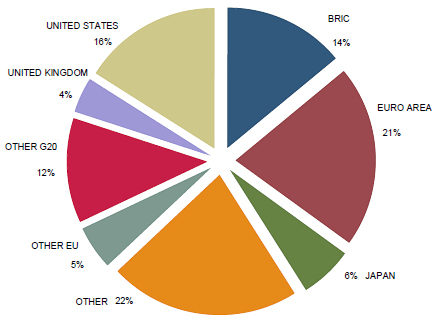 The IMF vote share: the US alone has more voice
than the five BRICS country combined (including South Africa: 0.78%)
In many ways, the constitution of the NDB is the result of the lack of governance reforms at the World Bank and the IMF, their limitations in maintaining the financial architecture of the world and dealing with global economic crises, and their inability to fulfil the developmental needs of developing and lower income countries. Emerging economies like the BRICS have been demanding greater representation in the governance of international financial institutions, and rightly so. But the IMF quota and World Bank voting systems have so far failed to address this demand. For instance, the 2010 quota reforms proposed by IMF member countries is yet to win US approval, which holds 16.75% of votes, without which the 85% approval required for important decisions is not possible. The voting rights — based on the relative weights of member countries calculated more than half a century ago — does not reflect the present strength and weights of the emerging economies such as the BRICS. China, as the second largest economy in the world, is assertive in the region in showing its power, but it has been constrained in the US-led financial institutions, due to its limited voting power. Even in the Asian Development Bank, China has only 6.5% of the stakes, though it is the largest economy in Asia, whereas Japan and the US have 15.6% of the stakes each. The constitution of the NDB, as it appears, tries to avoid the historical limitations of Bretton Woods institutions, particularly with respect to governance structure. First, each of the BRICS members will have one vote, and no member will have a veto power, unlike in the IMF where, without the approval of the US, no important decision is taken. Further, no one member can increase its share of capital without the consent of the four other members. Therefore, each member is equally powerful, and the changing economic stature of any country would not affect its representative power in the governance of the NDB. However, it is quite possible that the economic power of a country might influence the decision of the four other members. China contributed $41 billion to the contingency fund of BRICS, apart from its equal contribution to the initial $50 billion funding. To avoid frictions among the members, and especially India and China, the headquarters of the bank have been set in Shanghai, whereas the Presidency of the bank has been given to India for the first term. 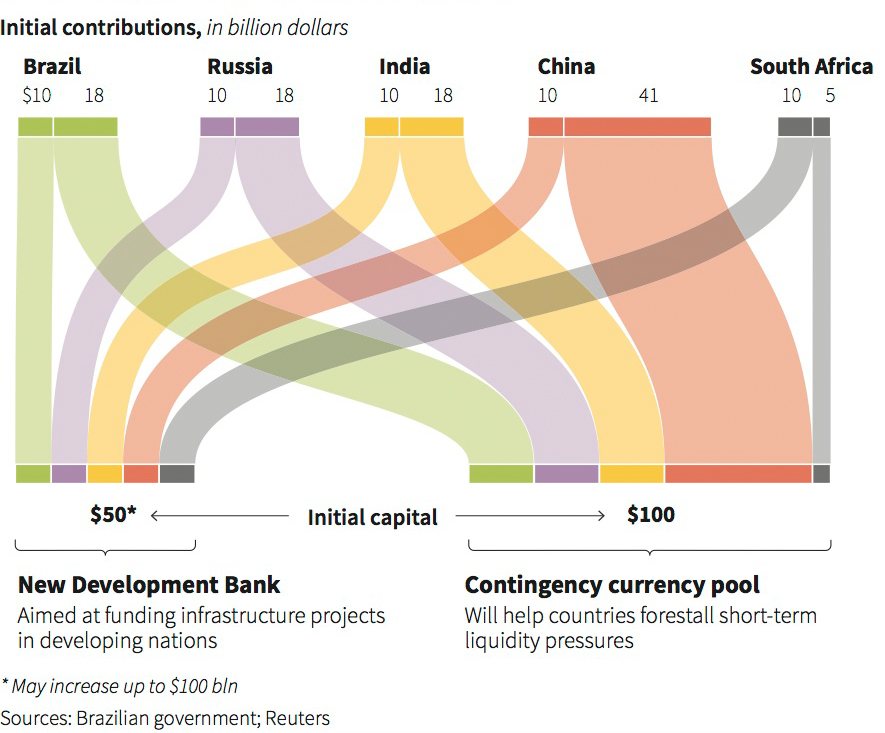 Contributions to the NDB
The NDB is completely justified on the economic rationale: sustaining high growth, and more so, productivity growth in manufacturing, requires huge infrastructure investment. Developing and upgrading infrastructure—transport, communication, trade logistics—would also facilitate further trade and benefit the BRICS countries. The NDB may play the role of a facilitating platform for more trade and investment among the BRICS countries. As of 2012, the intra-trade of the BRICS countries is around 10% of their total trade and the share of the BRICS in all BRICS outward Foreign Direct Investment is only 2.5%, though all BRICS members are most attractive investment destinations.
The BRICS countries are also experiencing rapid urbanisation, leading to pollution, congestion and higher demand for utilities. There is therefore an increasing demand for funds for sustainable infrastructure projects. Most of the BRICS countries are constrained by a lack of government resources and are relying increasingly on private sectors and multilateral organisations. Towards this end, the NDB is not only another source of funding; it may also encourage and facilitate the private sector to participate in infrastructure and sustainable developmental projects. The financial need for infrastructure development as well as liquidity in times of crises is huge, and the Bretton Woods institutions led by US and European countries lack the required capital and will. It is hoped that the total capital will increase beyond the modest initial capital, as things fall in place and the bank becomes functional. The NDB would also be a forum through which the financial resources of the BRICS would increasingly get invested in member countries, instead of flowing to developed countries. However, appropriate steps should be ensured for the proper representation and best practices of lending to be followed internationally. The headquarters of the bank being in Shanghai also re-enforces the trust that the BRICS member countries have in China. The world waits and watches, for the BRICS are here to stay and establish the economies of the member countries as leading powers in the global economy. |
The 2014 World Cup was a turning point in the modern history of Brazil. For the first time in the 16 years that I have known Brazil, I saw Brazilians wishing for the defeat of the Seleção! The Seleção has a sacred scent in Brazil. Whatever the social class, whatever the region of residence, whatever the skin colour, the Seleção has always transcended the diversity of this immense country, Brazil. But, last June, the sacred union cracked. The myth got wet. It started more than a year ago. For almost thirty years, since the end of the military dictatorship (1964-1985), Brazil was slightly dozing, enjoying an appreciable freedom of speech, a considerable growth in the rights of citizens… and one of the highest corruption rates in the world. But, on a good day of June 2013, some woke up. Seeing the contrast between the state of infrastructures (transports, schools, health) and the sumptuous expenses for the stadiums of the 2014 Cup, or fearing that the current president would use the cup for her elections ends, citizens came down in numbers to the streets. A Brazilian May 68… The splits of a democracy
While the Partido dos Trabalhadores (Workers Party), funded by Lula in 1980, was always an opposition party, it is now in the position of the accused. In power since 2002, it built itself, historically, on an image of integrity, of a fighter of injustices, under the dictatorship first, and then under the various liberal and socio-democrat governments of the 1990s. When it comes to power, 12 years ago, the PT is the symbol of a Brazil where everything has become possible. A steelworker, Lula, becomes president of the South American giant. Lula’s image shines brilliantly. In April 2009, Obama says about him, “He’s the man!” The expression has become popular here: “Ele é o cara.” And, since the constitution makes a third mandate impossible, Lula imposes his runner-up and heir in the party, Dilma Rousseff, as official presidential candidate of 2010, to represent the PT. But the situation gets complicated. In the course of the first year of her mandate, in 2010-2011, following the trial of the mensalão (a wide scale corruption scheme, under the first Lula government, to buy votes from MPs of the opposition), 7 ministers of her government are dismissed on charges of corruption: she desires to mark a certain break from the heritage of her predecessor. Petrobras and the popular Lula
And, in early 2014, happens the Petrobras case. This energy corporation is the largest Brazilian company. Several parties blithely took from the reserves of the PB, including the PT, to finance the 2010 elections. Investigations are ongoing and if it turns out that the president benefited from it, certain observers are not excluding for the possibility of impeachment procedures to be engaged against her. But, in spite of her efforts for a public image in contrast with him, Rousseff has been presiding over a country irremediably influenced by Lula and his invention, Lulism, a combination of socialism with a reformist and populist kind of state capitalism. Moreover, Lulism is clearly developmentalist. In other words, the economic growth, the increased demand in energy from the large urban centres, as well as the opening up of certain parts of the country, justify the sacrifice of other zones, with high ecological value, such as certain regions of the Amazonia (think of the Belo Monte dam). The great Brazilian photographer Sebastião Salgado summarised this paradox concisely: Lula has made it possible for 40 million Brazilians to enter the middle class, and consumption exploded. Here is what happens to Brazil: fighting against poverty, it topples over ecological destruction. All the great companies of the country partake to it… (Télérama, 15 October 2014) With the PT in power, unheard of and incontestable social conquests have received praises, including with the Bolsa Familia (the Family Allowance, a system of social aids that deeply changed the Brazilian socio-economic structure on the question of food insecurity), and they gave the party a considerable popular base. But corruption cases, also, have been noticed – corruption cases that have nothing to envy to the forms of corruption Lula fought against in the 1980s and 1990s, and in which he affirmed that the PT could never be involved, to become a party truly different, ethical, with integrity. But it is also under Lula that Brazil equipped itself with solid instruments of transparency permitting (at least in theory) for all to get acquainted with the ways in which public money is spent. It is also with Lula that the constitution of 1988, assuredly one of the most modern in the world, could be widely applied, making it possible for citizens’ rights to undergo a considerable leap forward. Under the PT, Brazilians thus matured democratically.
Back in 2014. Vote is mandatory in Brazil. But many question the electoral legislation, arguing that a true democracy must leave the choice to participate or not to the collective ritual that the vote is. These elections showed that Brazil is today an ideologically divided country. On 26 October, Dilma Rousseff, the outgoing president was re-elected with 52% of the votes, against her challenger, Aécio Neves, from the centre-right. According to specialists, this was the most disputed election since the return of democracy, 29 years back. A quick comparative glance between two countries like France and Brazil invites one to wonder if it is in the destiny of modern democratic nations to become each time more complex, more confused, split, fragmented because less naïve, more informed, more competitive and thus more difficult to govern. Aécio Neves lost by a historically short margin
against Dilma Rousseff The upcoming two big challenges of Brazil, besides the classical projects (health, education, transports), will certainly be the setting up of a development less destructive for the environment, and more ethical in the public affairs, in order to reduce significantly the endemic rate of corruption. Brazilians would thus confound a famous line, wrongly attributed to Charles de Gaulle, but in fact uttered in 1962 by Carlos Alves de Souza Filho, Ambassador of Brazil in France: “Brazil is not a serious country…” Translated from the French by Samuel Buchoul
|
||||||||
|
Pravakar Sahoo is an Associate Professor at the Institute of Economic Growth (IEG), Delhi. Prior to that, he worked as senior fellow at Indian Council for Research on International Economic Relations (ICRIER). He teaches Macroeconomics to Indian Economic Service officers and is conducts research in areas of Macroeconomics, International Trade & Investment, Economic Development, and Infrastructure.
|
Ludovic Aubin is a French sociologist and currently Visiting Professor at the Universidade Federal de Pernambuco (UFPE), Recife, Brazil. He is a trainer on questions of conflicts and crisis, and he is co-administrator at the Waldorf Satori school, Aldeia, in the state of Pernambuco, Brazil.
|
||||||||
Disclaimers: The opinions expressed by the writers are their own. They do not represent their institutions’ view.
LILA Inter-actions will not be responsible for the views presented.
The images and the videos used are only intended to provide multiple perspectives on the fields under discussion.
Images and videos courtesy: The Lacquerie | Real Instituto El Cano | Thomson Reuters | Travel Culture Mag | Diario Do Presal | Rappler
Voice courtesy: Samuel Buchoul
Share this debate… |
… follow LILA… |
||||
